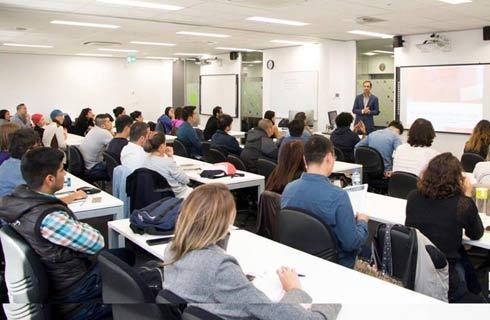材料与核工程理学硕士
Master of Science in Materials and Nuclear Engineering

学历文凭
Masters Degree

专业院系
Howard R. Hughes College of Engineering

开学时间

课程时长

课程学费

国际学生入学条件
The applicant must have a bachelor's degree in engineering or a closely related discipline. Admitted students with non-engineering backgrounds will be required to complete a set of courses that will assure successful completion of the M.S. specialization and qualify the student to sit for the Fundamentals of Engineering (FE) exam. The Graduate Program Committee or Graduate Coordinator will specify a list of required undergraduate courses that must be completed within the first year. These courses are in addition to those required for the graduate degree.
The applicant must submit an official copy of the Graduate Record Examination (GRE) test scores. The GRE university code for UNLV is 4861. The Mechanical Engineering Department code is 1502. The preferred score is at or above 70 percentile range in the quantitative reasoning section. The Graduate Program Committee can modify this requirement if necessary. The GRE requirement is waived for students participating in the Integrated BS-MS subplan.
The GPC will examine the applicant's academic record and will make the final determination of the applicant's admissibility to the M.S. program. In general, a minimum post-baccalaureate GPA of 3.00 on a 4.00 scale or equivalent is required for admission in addition to a GPA of 3.00 on a 4.00 scale or equivalent in all engineering courses.
English Proficiency:
Test of English as a Foreign Language (TOEFL): (Paper-based) Minimum score - 74; (Computer-based) Minimum score - 213; (Internet-based) Minimum score - 80
International English Language Testing System (IELTS): Minimum score: 6.5
Duolingo English Test (DET): Minimum score: 105
Michigan Test of English Language Placement (MTELP): Minimum score: 85
Pearson Test of English (PTE): Minimum score: 65
IDP—雅思考试联合主办方

雅思考试总分
6.5
- 雅思总分:6.5
- 托福网考总分:80
- 托福笔试总分:160
- 其他语言考试:Pearson Test of English (PTE) - Minimum score: 65
CRICOS代码:
申请截止日期: 请与IDP联系 以获取详细信息。
课程简介
Master of Science in Materials and Nuclear Engineering (M.S.M.N.E.) is intended to provide the student with a solid background in either applied nuclear science and engineering, with an emphasis in used fuel management, criticality, or radiation detection, or material science and engineering, with an emphasis in materials performance. The program consists of two master’s degree tracks: Materials Engineering and Nuclear Engineering. The materials engineering track consists of a core curriculum in material science, metallurgy, and materials performance, which is to be augmented by advanced level classes in corrosion engineering, physical metallurgy, mechanical metallurgy, mechanics of materials, and nuclear materials. The nuclear engineering track consists of a core curriculum in applied nuclear science and engineering, coupled with advanced classes in the student’s sub-discipline.
相关申请
 预科
预科 奖学金
奖学金 实习机会
实习机会 在校学习
在校学习 跨境学习
跨境学习 校园授课-线上开始
校园授课-线上开始 在线/远程学习
在线/远程学习
开学时间&学费
学费信息仅供参考,请与IDP联系以获取详细信息
| 开学时间 | 时长 | 学费 | 地点 |
|---|---|---|---|
| 暂无 | 暂无 | 暂无 | 暂无 |
学校排名

世界排名601
数据源:
泰晤士高等教育世界大学排名
关于内华达大学拉斯维加斯分校

内华达大学拉斯维加斯分校(UNLV)成立于1957年,至今已发展成为美国领先的研究机构和高等教育中心之一。大学拥有超过25000名本科生,其中许多学生是家里第一代大学生--他们父母之前都没有获得过大学学位。该大学以其多样性而闻名--有来自85个国家/地区的超过1000名国际学生在该机构就读。该分校还有100多个文化、种族或宗教性质的学生组织,学生可以在这些组织中认识类似背景的人,帮助学生感到更融入。学生们身处于拉斯维加斯热闹的气氛中,大学确保那些希望住在校园或附近的学生有很多令人兴奋的机会。对于想要宁静景观的学生来说,坐短途汽车就可以欣赏沙漠景观,为他们提供远离城市灯光的足够的休息空间。该大学有16个主要学院,提供广泛的学习课程选择。该大学还以其 ''酷学术"科目而闻名--最现代的专业或学习领域的组合,确保学生处于现代学习的最前沿。UNLV不仅仅有优秀的教学质量,而且还采用多样化的现代方法,确保学生处于所选领域的最前沿。该大学的学生支持服务非常优秀,各种服务确保学生不会因为个人问题而分散学习精力。该大学还为任何关心教育对财务影响的人提供了很高的性价比-2020-2021年,87%的UNLV本科生获得了财政援助和奖学金。
本校相关课程
其他相关课程

材料工程哲学博士
 达尔豪斯大学
达尔豪斯大学学历文凭
Ph.D.
开学日期
课程费用总额


材料工程学硕士
 达尔豪斯大学
达尔豪斯大学学历文凭
Masters Degree
开学日期
课程费用总额


材料工程应用科学硕士
 达尔豪斯大学
达尔豪斯大学学历文凭
Masters Degree
开学日期
课程费用总额


材料工程技术文凭
 北阿尔伯塔理工学院
北阿尔伯塔理工学院学历文凭
Bachelor Degree
开学日期
课程费用总额


先进材料与制造应用科学硕士
 渥太华大学
渥太华大学泰晤士高等教育世界大学排名:188
学历文凭
Masters Degree
开学日期
课程费用总额


先进材料与制造工程学硕士
 渥太华大学
渥太华大学泰晤士高等教育世界大学排名:188
学历文凭
Masters Degree
开学日期
课程费用总额










 美国
美国





